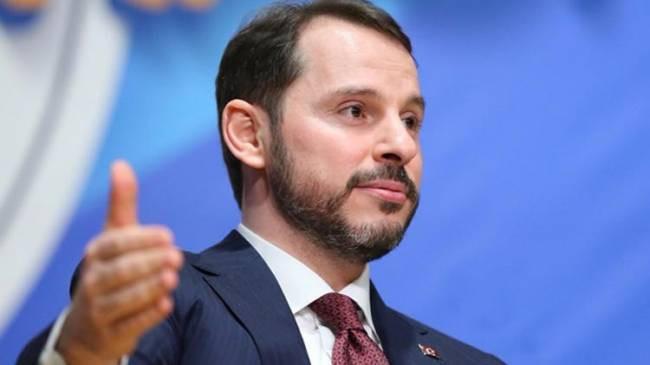
Turkey will see a downward trend in interest rates in days to come, Treasury and Finance Minister Berat Albayrak said on July 30, indicating that public banks will lower rates for loans this week.
“In the period ahead, we will see a downward trend in interest rates in Turkey. We will follow this primarily in public banks this week. I believe we will see concrete, clear steps as of August,” Albayrak said in a meeting with a group of journalists.
Asked if a decision by the Central Bank last week to cut its benchmark policy rate by 425 basis points from 24 percent to 19.75 percent should continue with further cuts, the minister recalled that the real interest margins in Turkey is still above other developing countries, but the country has entered an easing era of interest rates.
“With the serious loosening of interest rates in Turkey in the recent period and based on the fact that the interest rate trend will come down more clearly and strongly in the coming period, we have entered a period of interest rate cuts,” said Albayrak.
Yet, he pointed at the assessments of the Central Bank for further interest rate cut policy decisions based on data sets.
“We need to express this here: the central bank makes its monetary policy and interest rate decisions based on its data set,” he said.
The rate cut was Turkey’s biggest since at least 2003, and it was the first policy decision under new Central Bank Chair Murat Uysal, who took the reins after President Recep Tayyip Erdoğan sacked former governor Murat Çetinkaya some three weeks ago. The President has long urged lower rates and said he made the move because Çetinkaya did not follow instructions.
Turkish economy to enter a better period
The Turkish economy will enter more positive period by the second half of the year, leaving all the “political uncertainties” behind, said the minister. The Turkish economy has “left the worst behind” and “averted the risks it faced,” Albayrak said, noting that the country has seen a successful year in practicing its “balancing” policies in the economy, which he said was “better than expected.”
“One year ago, even I did not expect such a rapid recovery,” he said.
The economic indicators are expected to be much more positive in the second half of 2019, and Turkey will close the year with inflation below New Economic Program targets, he noted. The minister said that the year-end inflation rate for 2019 will be lower than the 15.9 percent goal determined in the New Economic Program announced in September 2018.
Earlier this month, Reuters reported that efforts to clean up the debt have stalled after initial plans for restructurings were put on hold. Albayrak said the government will not compensate losses.
“The private sector will conduct this process by themselves. There is no such thing as: ‘The government should do this, compensate losses’,” he said. “We will equally support the demands of all sectors.”
More than $10 billion foreign investments entered Turkey since May, the minister said.
“Investors, who trust Turkey, have gained” in this period, he stated. Referring to last year’s turbulence, when Turkey’s economy tipped into recession after a currency crisis, the minister said none of the pessimistic scenarios have been realized. He pledged that a revised economic program will be announced in September and be practiced “more strongly.”
About the possible U.S. sanctions on Turkey over Russian S-400 missile systems, Albayrak said he expected that the pressure of possible sanctions will have a minimal effect on the Turkish economy. Continued talks with Washington and statements by U.S. officials on ties with Turkey display a “more positive process” with regards to possible U.S. sanctions, he said.
The possible impact of the acquisition of S-400s from Russia on the Turkish economy is much lower, the minister stated. Washington has threatened to slap sanctions on Turkey under the Countering America’s Adversaries through Sanctions Act (CAATSA), which aims to prevent countries from purchasing military equipment from Russia. U.S President Donald Trump, however, is reluctant to harm ties with Turkey by imposing any sanctions.